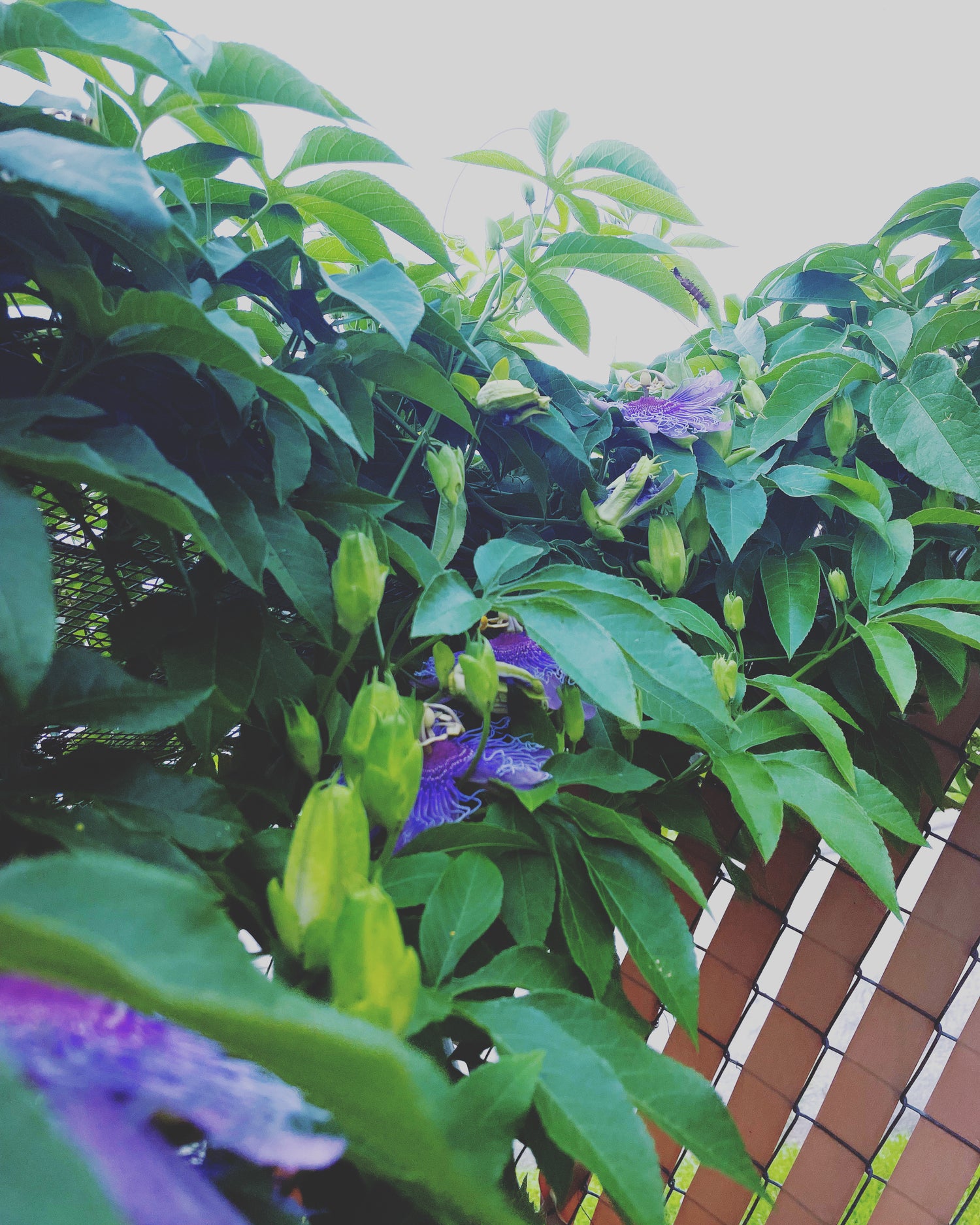
Familiar Names:
Maypop, Passion-vine, Holy Trinity Flower, Passionflower, Old-field apricot
Concise History
Passionflower received its name from Spanish and Italian missionaries who associated it with Christ's spiritual crucifixion. The five petals and five sepals of the blossom represent the ten faithful apostles of Christ. The corona resembles the crown of thorns that Jesus wore; the five stamens represent Christ's five most prominent wounds. Lastly, the curling tendrils symbolize the vines used to whip him, and the leaves represent the hands of his persecutors. The term Passionflower is an appellation to remember the Passion of Christ.

Historically Accepted Usage
- Parts Used: leaf, flower, stems, roots, and fruit
- Herbalist preparations: oil infusions, tinctures, poultices, and compresses
- Tea Ratio: 2 teaspoons of dry leaf and bloom for 8oz of water or milk
The modern usage of Passiflora incarnata stems from American Indians who relished the fruit and applied the crushed leaves as a poultice to treat bruises and other injuries. There is also a record of American Indians using Passiflora to make tea from the woody vines to soothe their nerves. The entire passionflower plant may be used interchangeably in oil, water, alcohol, vinegar, and other constituents. Practitioners of herbalism developed tinctures, poultices, salves, and more to treat the nervous, reproductive, musculoskeletal, respiratory, and cardiovascular systems. Passionflower was a renowned herb in history and continues to be a staple in the cupboard. Even if you just want to make tea.
Discovering Passionflower by Althea Theresa
 One Florida evening, my husband and I took a different route in our routine stroll. We just moved into the neighborhood and decided to check out the scenery and get acquainted. As we wandered, we noticed the Holy Trinity Flower. Thriving as regal as can be, in a vacant lot, trailing and climbing onto a pine tree and sending out several offshoots at ground level. Day by day, we walked by the empty lot, considering taking a sprout home with us. The first time we tried to get an offshoot, my husband pulled it up vigorously and accidentally disturbed the roots; it didn't grow. On our next stroll, we brought a hand shovel and dug up about four or five sprouts. We planted it in pots using potting soil, and only one out of the five plants survived.
One Florida evening, my husband and I took a different route in our routine stroll. We just moved into the neighborhood and decided to check out the scenery and get acquainted. As we wandered, we noticed the Holy Trinity Flower. Thriving as regal as can be, in a vacant lot, trailing and climbing onto a pine tree and sending out several offshoots at ground level. Day by day, we walked by the empty lot, considering taking a sprout home with us. The first time we tried to get an offshoot, my husband pulled it up vigorously and accidentally disturbed the roots; it didn't grow. On our next stroll, we brought a hand shovel and dug up about four or five sprouts. We planted it in pots using potting soil, and only one out of the five plants survived.
I kept my only Maypop in a pot for years. It was alive and trailing but did not flower. Later I decided to join my family in Louisiana; I purchased a house in a small town and began assembling my garden, making plans, treating the soil, and coordinating the plants with the sun's position. It was time, I found the ideal spot and placed it on the ground among companion plants, and the old field apricot took off. With very little care, she now stretches over 30 feet long, trellising above several other plants, climbing the fence, and producing over half a pound of flowers per day.
Restoring Heartbreak
Spiritual & Soothing Bath
Ingredients:
- 1 cup Epsom salt
- 1 cup of powdered milk or oatmeal
- Herbs - yellow rose petals, calendula flowers, violet leaves, self-heal, lavender, and passion flower blossoms
- Essential oils - 12 drops sweet orange, 6 drops of lavender
- Crystals - Amethyst, Smoky quartz, Rose quartz
Guided Preparation
- Run water and pour Epsom salt, powdered milk or oatmeal simultaneously under running water. Sprinkle herbs and distribute essential oils evenly. Ensure the water is at your most desired temperature.
- Step into the tub, relax your mind and body, dip your head underwater, or just your face (if you wish not to wet up your hair).
- Place the crystals on your head, heart, and in your hands.
- Close your eyes and wander through a meditation that is soothing to you.
- If you feel called to, create a meaningful manifestation of self-love and repeat. if not, repeat after me.
"I am no longer a prisoner. With intent, I have liberty. I am no longer a prisoner of heartbreak. I am free. I am resilient. I am worthy, I am lovely, I am free to love and be loved unconditionally."
Repeat as needed

Passiflora incarnata teaches us to expand beyond our current circumstances and seek out the unknown. She offers gifts of shade, fruit, nectar, pollen, therapeutic leaves, and flowers to all those around her. She is an emblem of unquestioning love and forgiveness.

